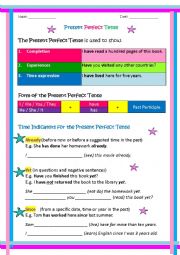
|
Present perfect tense_since, for, yet, ever, already, just
Hi fellow teachers, I am very sorry I uploaded the wrong one. Here is the one I intented. This handout includes brief notes + exercises on 1) when present perfect is used 2) The difference between the use of YET, ALREADY, EVER, JUST; also FOR vs SINCE for HOW LONG questions; there is also a verb table at the end.
Sorry for making you uploaded the ...
Level: intermediate
Age: 10-100
Type: worksheet
Downloads: 131
|
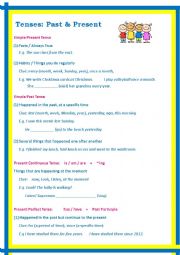
|
Tense_Past & Present
Hi! The handout contains explanations and notes for present tenses (simple, continuous, present perfect) and past tenses (simple, past continuous). It also provides time clue words that can help students identify which tense to use. There is also an exercise at the end. Answer key is also included. Hope you find it helpful.
Level: intermediate
Age: 9-100
Type: worksheet
Downloads: 33
|
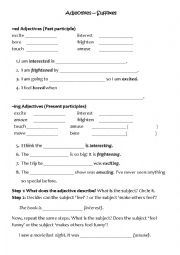
|
adjective suffix:~ed adjective vs ~ing adjectives
This is note/explanation + exercise on adjective suffix (~ed, ~ing). It is used with the PowerPoint, and Roll the Dice game (both uploaded earlier). The first page explains the formation, followed by exercise and a table of adjectives with ~ing and ~ed suffixes.
Hope it helps you :-)
Level: elementary
Age: 7-11
Type: others
Downloads: 28
|
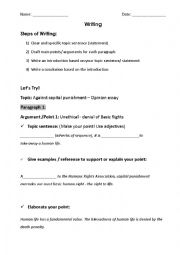
|
Writing_For or Against_Opinion Essay
A step-to-step guide with exercises to writing a ��for or against essay��. These ten pages note + WS include strategies (rhetorical question, statistic, definition, famous quote) to write an introduction; different sentence structures (adjectival phrase: It is �Kto; noun phrase); relevant idioms (an eye for an eye); ideas related to the topic; brai...
Level: advanced
Age: 15-100
Type: worksheet
Downloads: 49
|
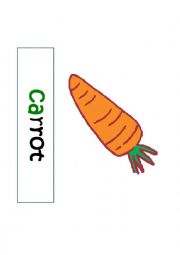
|
Vegetables
These flash cards introduce different kinds of vegetables. THere is a worksheet and a bingo game (in another upload) which teachers can use as consolidation after teaching these vocabulary.
Level: elementary
Age: 5-9
Type: flash-card
Downloads: 14
|
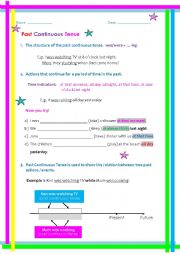
|
Past Continuous Tense: when vs while, time words, simple past vs continuous
Hello fellow teachers, this handout includes brief explanation, Fill in the Blanks exercise and Sentence Rearranging exercises on 1) the use of Past Continuous Tense, time words: at that moment, all day, all night, at that time, at nine o��clock last night 2) a graphic illustration on the use of Past Simple vs Past Continuous, 3) the difference b...
Level: intermediate
Age: 9-100
Type: worksheet
Downloads: 109
|
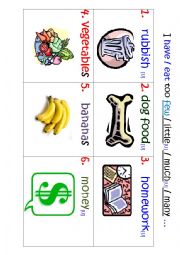
|
Countable and Uncountable Noun 3
Students get into groups of 3-4. Take turns to roll the dice and make a setence using too much, too few, too little, too many (according to the picture). This activity can be carry out after using the PowerPoint I upload earlier (Doctor Advice PowerPoint - Countable and Uncountable Noun) The PowerPoint shows the poor eating habit of Mr Skeleton. Th...
Level: elementary
Age: 7-9
Type: others
Downloads: 21
|
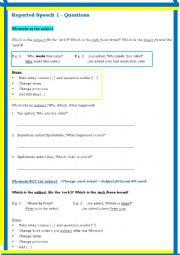
|
Reported (Indirect) Speech _Reporting Questions
Show students the steps of reporting questions, plus exercises.
Level: intermediate
Age: 9-100
Type: grammar-guide
Downloads: 30
|
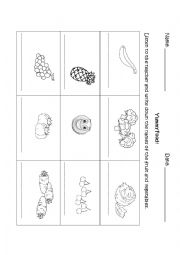
|
vegetables and fruit Bingo
This is used as consolidation after teaching students vegetable and fruit names using flashcards (uploaded earlier) and vegetable worksheets (uploaded earlier). For younger children/less abled, they are only required to listen to the vegetable /fruit names. For more abled students, you can ask them to write down the vegetable names. Hope you like i...
Level: elementary
Age: 6-8
Type: activity-card
Downloads: 2
|
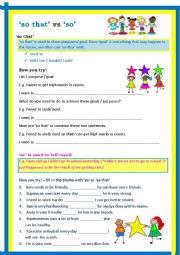
|
connective_so_so that
Hi! The note/worksheet introduces the use of so that to express purpose. It also explain the difference betweem so and so that. Exercises and answer key are included. Hope you find it useful!
Level: intermediate
Age: 9-17
Type: worksheet
Downloads: 94
|
|
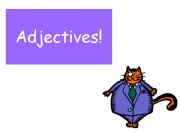
ed adjectives vs ing adjectives
The PowerPoint also contain some drilling questions. There is a worksheet (uploaded earlier) which can be used with this Powerpoint
Level: elementary
Age: 7-12
Downloads: 71
|

Countable and Uncountable
Students play the role of a doctor and give recommendation to patient to have a healthy eating habit (using quantifiers). There are also two activity worksheets (for students to write down their advice as doctors). You may want to also download them. There are 14 sildes in this PowerPoint
Level: elementary
Age: 8-10
Downloads: 55
|
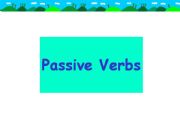
Passive voice
It focus on the changes in verb forms in passive voice (e.g. eats - is / are eaten; has eaten - has/ have been eaten...etc). Since it is decorated, teachers can also print out the slides and post them on the board or treat them as handout to give to students as reference while they are working on pa...
Level: intermediate
Age: 9-17
Downloads: 15
|
|
|